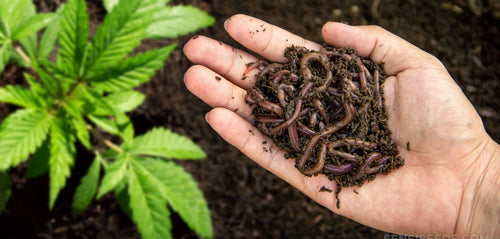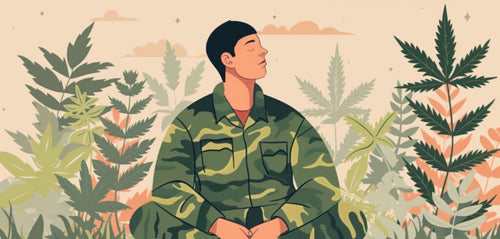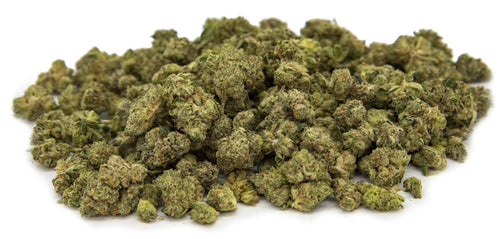#104: "Thinking for the First Time": How Cannabis Inspired The Beatles
#104: "Thinking for the First Time": How Cannabis Inspired The Beatles
"We're Sgt. Pepper's Lonely Hearts Club Band, We hope you will enjoy the show" sang The Beatles on their iconic album released in 1967. These words, along with the album's trippy cover art, marked the band's full dive into psychedelic rock and experimentation. Shifting away from their earlier pop sound, The Beatles began to explore new musical territories, thanks in part to their use of cannabis.
Before their cannabis-influenced era, The Beatles were known for their catchy tunes and clean-cut image. "I Want to Hold Your Hand" and "She Loves You" were the kind of songs that made teenagers scream and swoon. But as their music evolved, so did their influences. The use of cannabis (and other drugs) profoundly impacted their creativity and sound, leading to the creation of their groundbreaking album "Sgt. Pepper's Lonely Hearts Club Band".
Act 1: Mop tops to flower power
When the Beatles released their first album, "Please Please Me", in 1963, they became an instant sensation. With their catchy tunes and charming personalities, the Fab Four shot to fame and became the face of the British Invasion in America. Teenage girls couldn't get enough of John, Paul, George, and Ringo.

From 1962 to 1964, The Beatles churned out hit after hit, becoming the best-selling music act on the planet. As their popularity grew, so did their influence on pop culture. Their music and style were replicated by countless other bands such as The Byrds and The Monkees, solidifying their status as cultural icons.
But by the mid-1960s, The Beatles were no longer satisfied with making pop music. They wanted to experiment and push creative boundaries. Albums like "A Hard Day's Night" showed the beginnings of this shift, with more complex songwriting and innovative production techniques. However, it wasn't until they started using cannabis that their music truly changed.
The band first tried cannabis in the early 1960s after a gig in Hamburg, but they barely noticed any effects. As George Harrison put it, "Everybody was saying, 'This stuff isn't doing anything.' It was like that old joke where a party is going on and two hippies are up floating on the ceiling, and one is saying to the other, 'This stuff doesn't work, man.'"
Perhaps they didn't ingest enough, or maybe they were smoking low-quality cannabis. Afterall, how strong could weed in Germany have been in the early 1960s? But in 1964, another cannabis encounter, this time with Bob Dylan at the Delmonico Hotel in New York City, changed everything.
Paul McCartney recalls that it felt like he was "thinking for the first time" and John Lennon described the evening as "party time," filled with laughter and surreal discussions. This marked the beginning of The Beatles' exploration with cannabis and its influence on their music.
Act 2: Creativity unleashed
After their encounter with cannabis and Bob Dylan, The Beatles' music took a dramatic turn. Their creativity was unleashed and their music became more introspective, philosophical, and experimental. The album "Rubber Soul" was the first example of this shift, with songs like "Drive My Car" and "Nowhere Man" showcasing a deeper lyrical depth. Referred to as their "pot album" by John Lennon, it set the tone for their future musical endeavours.
Psychedelic experimentation was at its peak in the 1960s, and The Beatles were quick to embrace it. With their use of cannabis, LSD, and other psychedelic drugs, they continued to push the boundaries of their music and incorporate new sounds and styles. Eastern influences also became prominent, particularly with George Harrison's interest in Indian music and culture.

The band's "Revolver" album, released in 1966, is considered a landmark in their musical evolution. Songs like "Eleanor Rigby" and "Yellow Submarine" were heavily influenced by their psychedelic experiences and the use of cannabis.
But it wasn't until 1967, with the release of "Sgt. Pepper's Lonely Hearts Club Band," that The Beatles truly solidified their status as pioneers of psychedelic music. From the band's cover art, which featured them surrounded by various psychedelic and countercultural icons, to the music itself, which was a fusion of different genres and experimentation, this album became an instant classic.
Later albums like "The White Album" and "Abbey Road" continued to push boundaries and showcase the band's growth and experimentation. With songs like "While My Guitar Gently Weeps" and "Come Together," The Beatles further delved into introspection, philosophy, and social commentary.
Even after the band's breakup in 1970, each member continued to showcase their influences and experimentation with psychedelic music. John Lennon's solo work, particularly the album "Imagine," features strong themes of peace, love, and social change.
The impact and legacy of The Beatles' cannabis and psychedelic experiences can still be felt in music today. From the Grateful Dead to Pink Floyd and countless other artists, the influence of The Beatles' experimentation and musical evolution has continued to shape and inspire musicians for decades.
Would the Beatles have reached the same heights of success and creativity without cannabis and psychedelics? It's hard to say for sure, but one thing is certain: their abrupt shift towards an experimental and introspective sound coincided with their use of these substances. And their impact on music, culture, and society as a whole is undeniable.
The beat goes on
The lasting impact and legacy of The Beatles music through the decades is a testament to their talent, creativity, and willingness to push boundaries. The 1960s may have been a time of experimentation and change, and the Beatles were at the forefront of this movement. Without a doubt, their experiences with cannabis and psychedelics played a major role in shaping their music and ultimately, their legacy.
What's the lesson here? Perhaps it's that sometimes, in order to create something truly groundbreaking and impactful, we have to think outside of the box and explore new perspectives. The Beatles showed us that sometimes, breaking away from the norm and embracing new experiences can lead to true genius. So let's open our minds and embrace the power of music, creativity and cannabis, just as The Beatles did so many years ago.
Back to all posts









